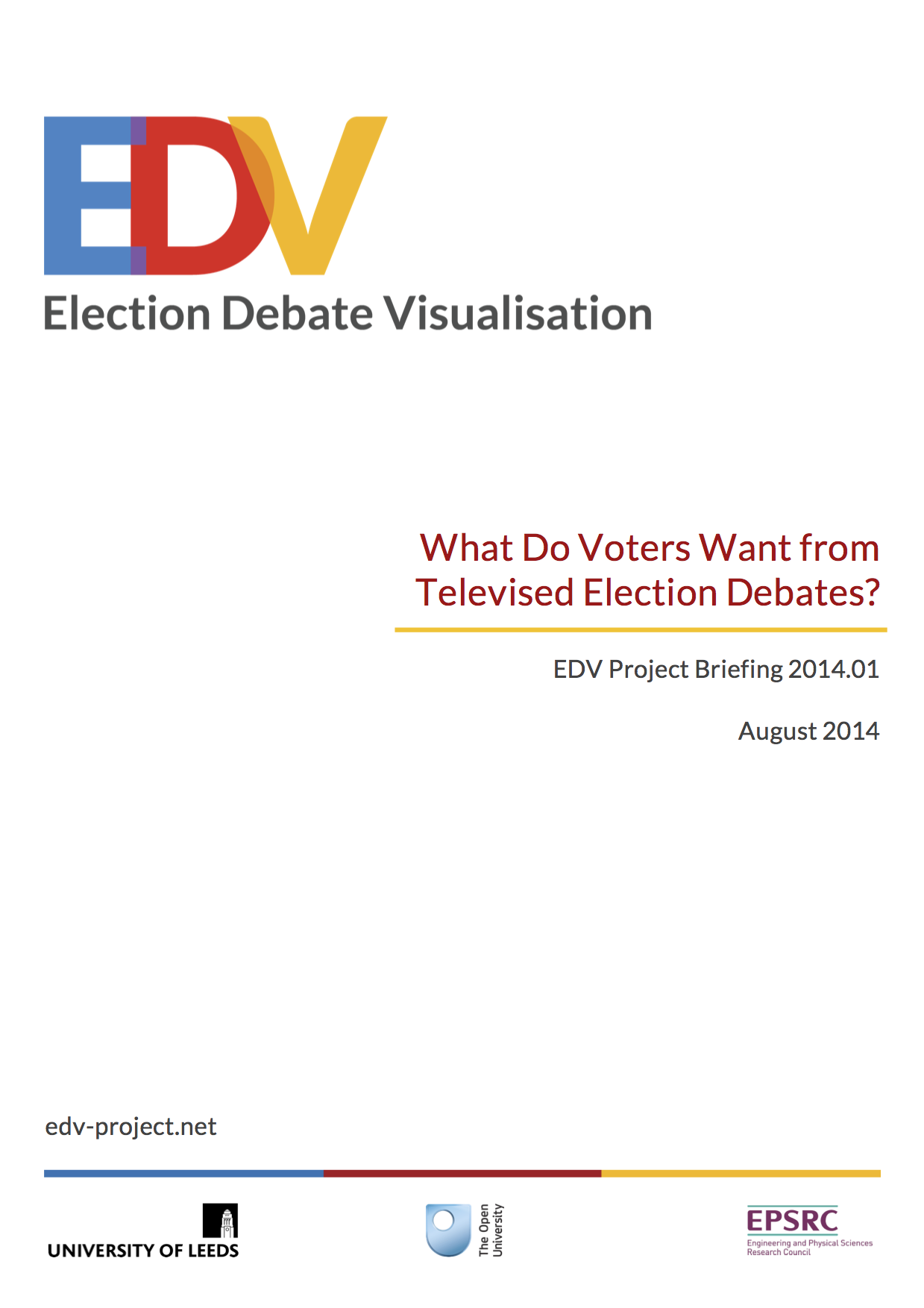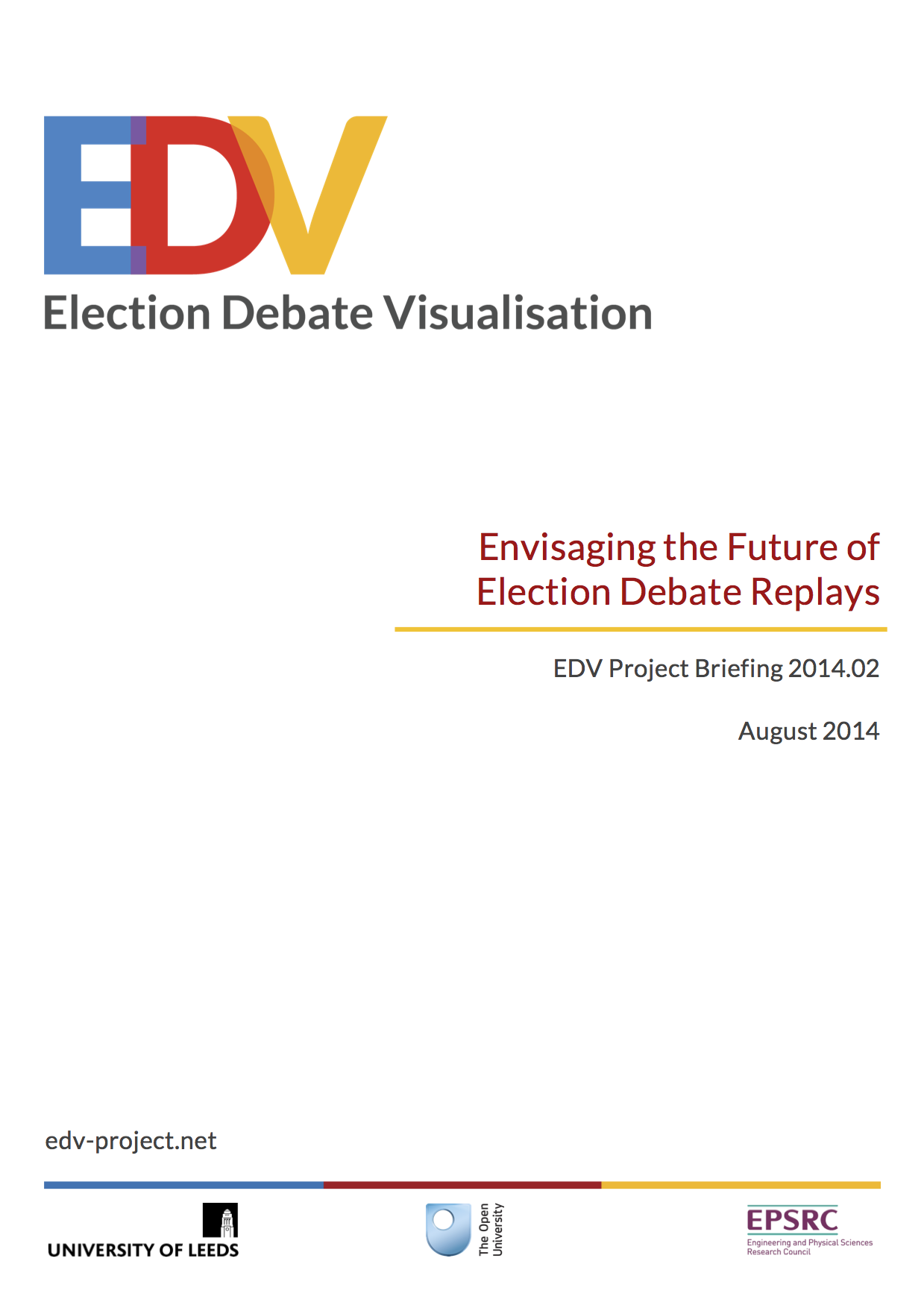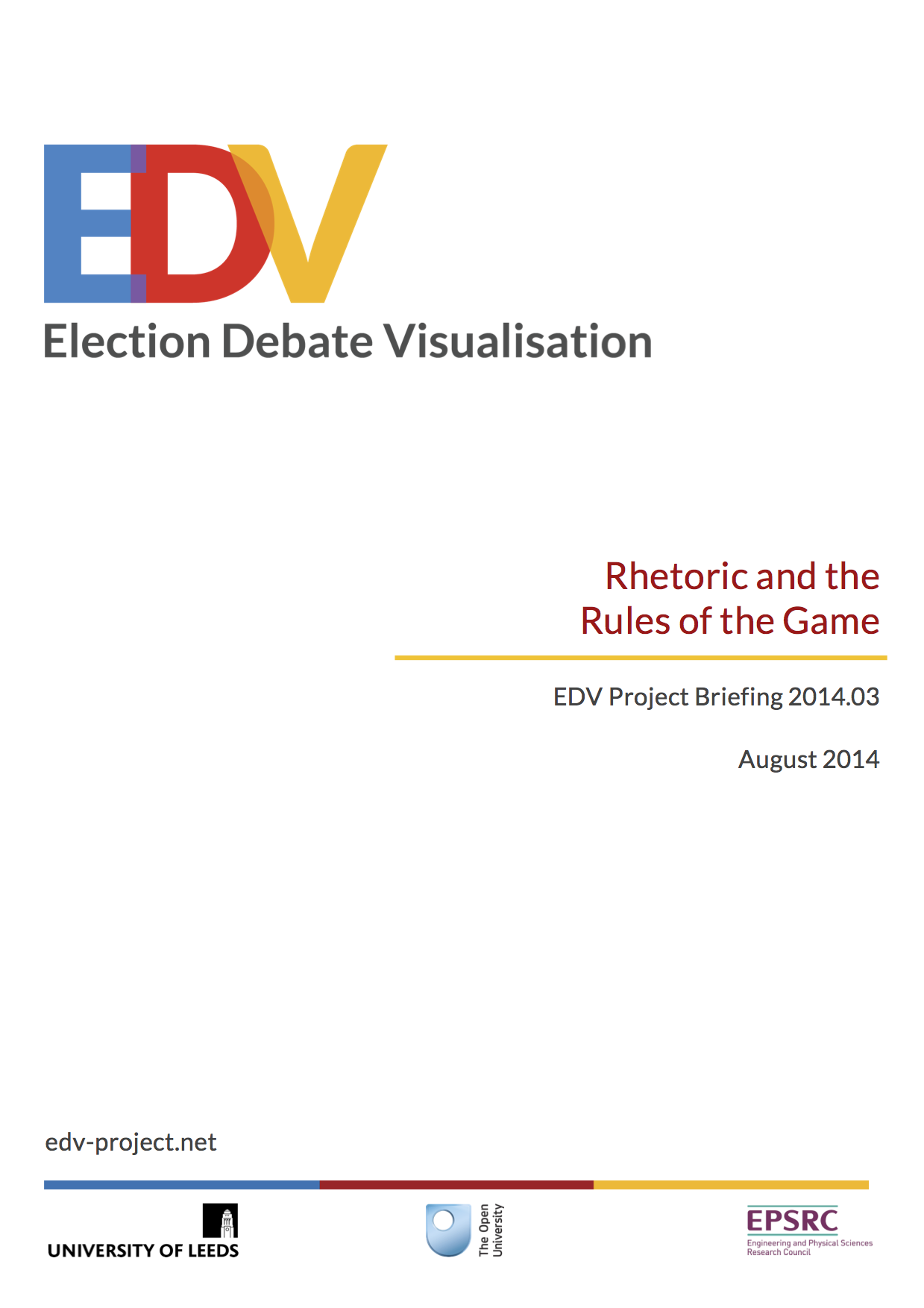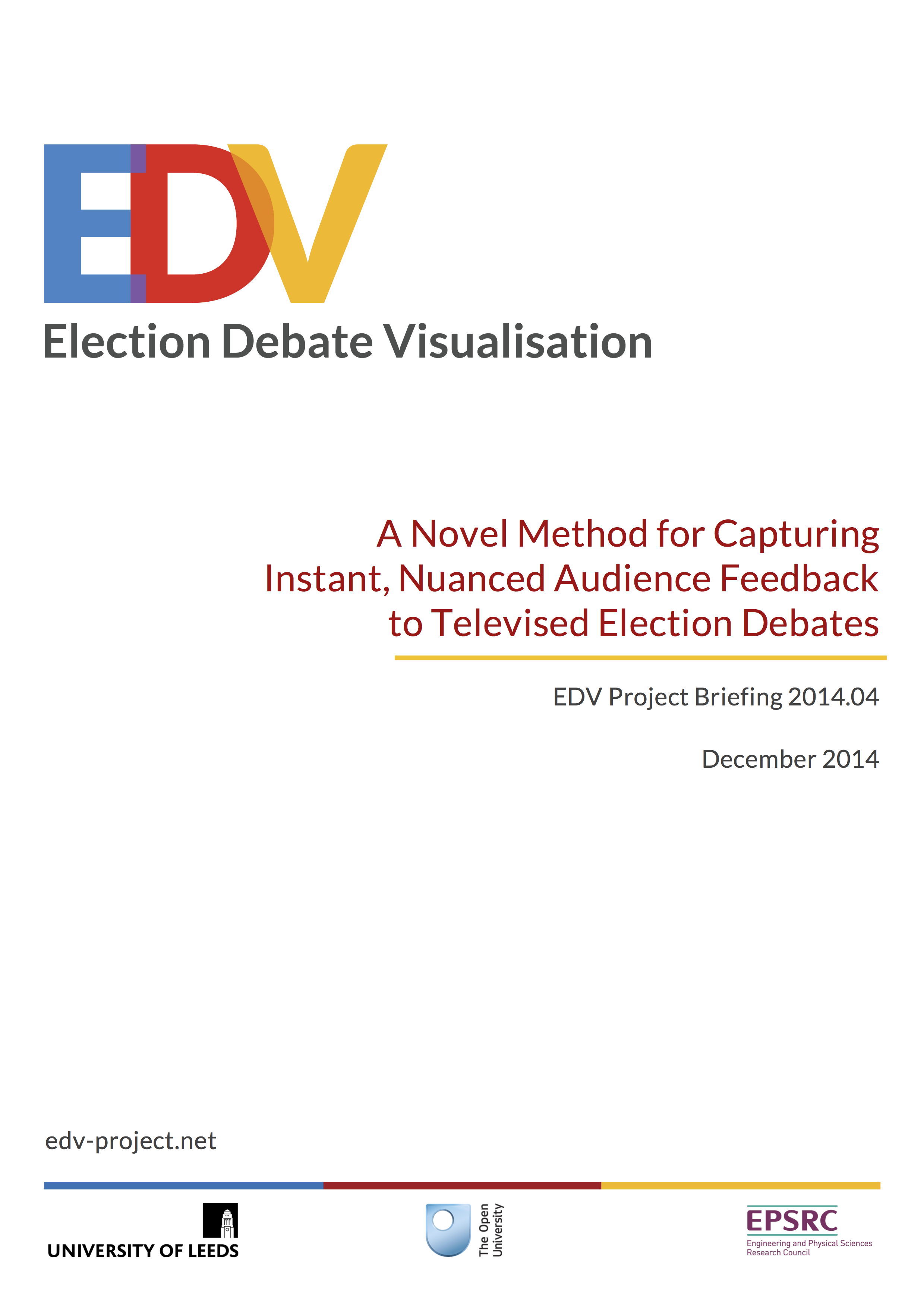We’re blogging our thoughts, and will be posting research publications, talks, videos and demos, project briefings, software, and datasets as the project unfolds.
Publications
- Stephen Coleman, Giles Moss and Alvaro Martinez-Perez (2018), Studying Real-Time Audience Responses to Political Messages: A New Research Agenda. International Journal of Communication, 12, 1696–1714, April 2018.
- Brian Plüss and Anna De Liddo (2018), Democratic Replay: Enhancing TV Election Debates with Interactive Visualisations. In Proceedings of the 51st Hawaii International Conference on System Sciences (HICSS 2018), Waikoloa Village, Hawaii, 3-6 January 2018.
- Anna De Liddo, Brian Plüss and Paul Wilson (2017), A Novel Method to Gauge Audience Engagement with Televised Election Debates through Instant, Nuanced Feedback Elicitation. In Proceedings of C&T ’17, Troyes, France, 26-30 June 2017.
- Brian Plüss and Paul Piwek (2016), Measuring Non-cooperation in Dialogue. In: Proceedings of the 26th International Conference on Computational Linguistics (COLING 2016), Osaka, Japan, 11-16 December 2016.
- Stephen Coleman and Giles Moss (2016), Rethinking Election Debates: What Citizens Are Entitled to Expect. The International Journal of Press/Politics, 21(1), 3-24, January 2016.
- Brian Plüss and Anna De Liddo (2015), Engaging Citizens with Televised Election Debates through Online Interactive Replays. In Proceedings of TVX 2015, the ACM International Conference on Interactive Experiences for TV and Online Video, pp. 179-184, Brussels, Belgium, 3-5 June 2015.
Talks
- Communication of Debate Aspects to Different Audiences. Dagstuhl Seminar on Debating Technologies. Dagstuhl, Germany, 17 December 2016.
- Detecting Speakers’ Violation of Democratic Entitlements in Political Debates. 1st European Conference on Argumentation. Lisbon, Portugal, 11 June 2015.
- New Debate Visualisations in the UK – The Election Debate Visualisation Project. 2nd European Technology Assessment Conference. Berlin, Germany, 25 February 2015.
- Election Debate Visualisation Project. University of Leeds’ Political Communication Research Group Seminar. Leeds, UK, 16 October 2014.
- Collective Intelligence Meets the Political Agenda: Enhancing Election Debate to Foster Viewers’ Engagement. Catalyst Worksop on Collective Intelligence for the Common Good. London, UK, 29 September 2014.
- From Argument Mapping to Argument Mining, and Back. 2014 SICSA Workshop on Argument Mining. Dundee, UK, 10 July 2014.
- The Election Debate Visualisation Project. The Open University’s KMi Internal Seminar. Milton Keynes, UK, 19 June 2014.
Videos and Demos
EDV Project Briefings
The EDV team will be releasing a series of briefings as the research progresses, intended to disseminate different aspects of the project to a general audience.
Below are the first four EDV Project Briefings. They describe our focus group research into voters’ thoughts, concerns and desires in connection with election debates (What Do Voters Want from Televised Election Debates?); our views on how technology can help address some of these issues (Envisaging the Future of Election Debate Replays); our ideas on how to help debate-viewers detect communicational strategies from the politicians that could result manipulating or confusing (Rhetoric and the Rules of the Game); and a novel approach to letting viewers have a say during the debate (A Novel Method for Capturing Instant, Nuanced Audience Feedback to Televised Election Debates).




Work is already in progress to produce one more briefing on designed visualisations that enhance the debate viewing experience. Watch this spot for future releases…
Meantime, here are key publications from the team which set the context for EDV. See their personal pages for more.
Buckingham Shum, S. (2003). The Roots of Computer-Supported Argument Visualization. In: Kirschner, P.A., Buckingham Shum, S. and Carr, C. (Eds) Visualizing Argumentation: Software Tools for Collaborative and Educational Sense-Making. London: Springer-Verlag, pp.3-24. [pdf]
Coleman, S. (2010). Leaders in the Living Room – the Prime Ministerial Debates of 2010: Evidence, Evaluation and Some Recommendations. Oxford: Reuters Institute for the Study of Journalism.
Coleman, S. (2013). Debate on television: The spectacle of deliberation, Television and New Media. 14.1: pp.20-30.
Coleman, S. and Moss, G. (2012) Under Construction: The Field of Online Deliberation Research. Journal of Information Technology & Politics (Special Issue on Online Deliberation: Developments and Future Directions), 9 (1), (Feb. 2012), pp.1-15.
De Liddo, A. and Buckingham Shum, S. (2010). Capturing and Representing Deliberation in Participatory Planning Practices. In: Fourth International Conference on Online Deliberation (OD2010), 30 Jun – 2 Jul 2010, Leeds, UK.
Moss, G.S. and Coleman, S. (2013). Deliberative Manoeuvres in the Digital Darkness: E-Democracy Policy in the UK. British Journal of Politics and InternationalRelations. 4th feb. 2013. doi: 10.1111/1467-856X.12004
Plüss, B., (2010). Non-Cooperation in Dialogue. Proceedings of the ACL 2010 Student Research Workshop, pp. 1-6, Uppsala, Sweden, 11-16 July 2010. [pdf | poster ]
Plüss, B., Piwek, P. and Power, R. (2011). Modelling Non-Cooperative Dialogue: the Role of Conversational Games and Discourse Obligations. Proceedings of SemDial 2011, the 15th Workshop on the Semantics and Pragmatics of Dialogue, Los Angeles, California, 21-23 September 2011. [pdf | poster]
Plüss, B., (2013). A Computational Model of Non-Cooperation in Natural Language Dialogue. PhD Thesis. The Open University.
